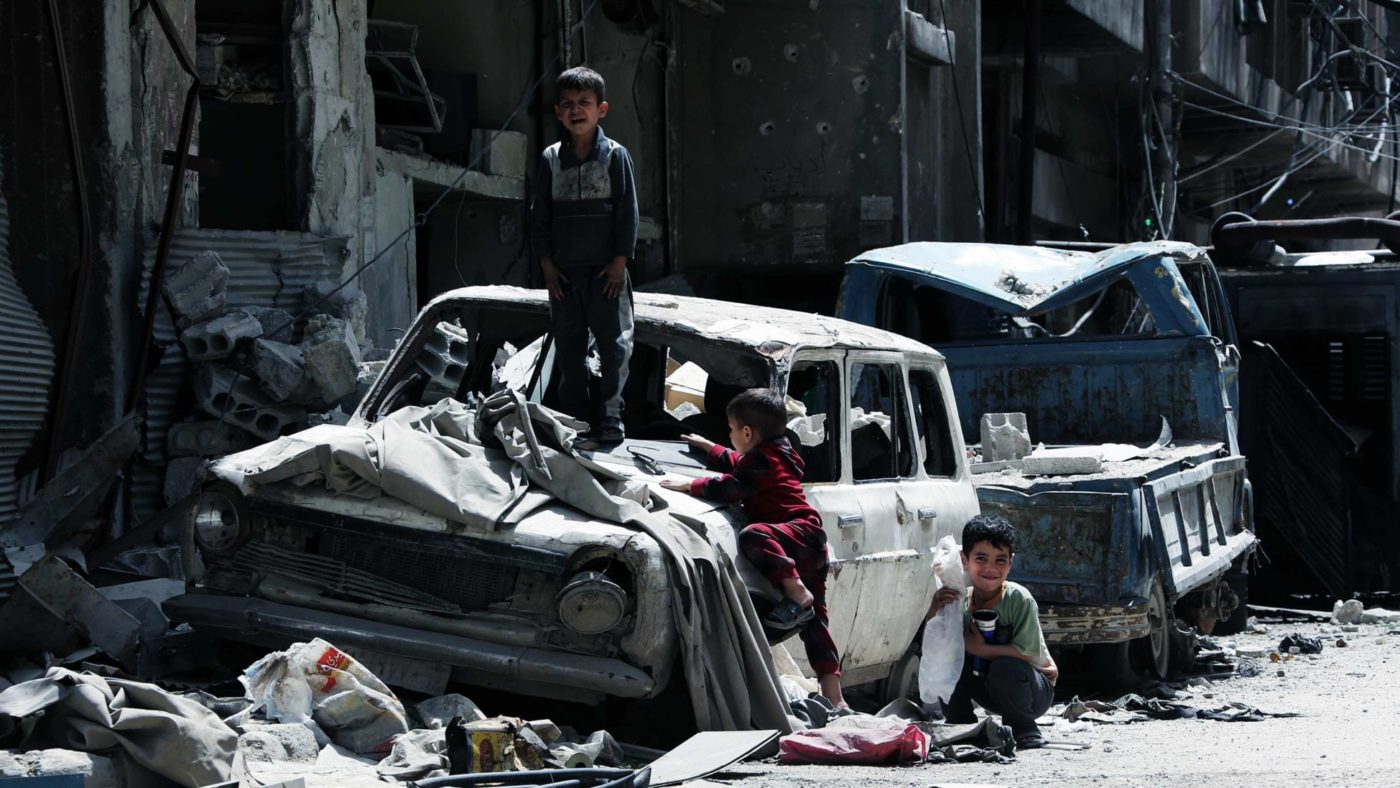As the Syrian war reaches its terminal stages, open conflict has given way to a PR war.
The regime of Bashar al-Assad, backed by its Russian and Iranian allies, desires legitimacy and recognition. Assad is unlikely to receive it. His enemies wish to make it clear that, though the regime looks unlikely to fall, its essential character and its crimes exclude it from the community of nations.
To that end, the United States, Britain and France made a show of retaliating against the regime after it used chemical weapons in Douma earlier this year. Israel regularly strikes the regime’s Iran-affiliated militias and its air force operates freely over Lebanon, making a mockery of Assad’s claimed sovereignty.
Those forces which either failed to remove Assad or consciously refrained from confronting the regime have their own public relations to maintain. They make a show, now, of tabulating and memorialising the regime’s crimes. Governments and NGOs sponsor exhibitions of the evidence of mass murder in Syria’s prisons. International bodies gather data on mass graves, chemical attacks, and other atrocities. There is certainly plenty of evidence, plenty of data, to gather. It is claimed that these efforts could lead to prosecution and the extension of international justice into Syria’s previously lawless conflict.
Observers would be forgiven for reacting positively to news that France, last month, aimed international arrest warrants at three men associated with the regime’s worst excesses. The men – Ali Mamlouk, a senior advisor to Assad, Jamil Hassan, head of the Syrian air force’s justly feared intelligence agency, and Abdel Salam Mahmoud – are worthy targets of prosecution. All are implicated in repressive tactics used by the regime as well as acts of barbarism and criminality.
But these people will not be arrested. Hassan’s arrest has previously been sought by Germany, with no result. While they remain within the edifice of a still insecure regime, a state on a permanent war footing, the three men will be outside the confines of both international law and morality. Most likely, the French hope that naming regime officials known to have transgressed will add some small pressure to Assad’s ability to act with impunity and its pretence that things are returning to normal.
This strategy has its problems though. International justice is hardly a fixed notion to which all nations subscribe. The United States, a stated opponent of the Assad regime, is not a signatory to the statute which established the International Criminal Court; nor is Russia, an essential ally of the Syrian government.
And there exists no effective mechanism for trying and convicting those who still have somewhere to run and somewhere to hide. War criminals with powerful friends still find it alarmingly easy to remain free men. Nor is there the will required to really get tough on the Assad regime. More force than the international community can muster would be needed to get Damascus to offer up its worst officials.
The countries which really matter in relation to Syria either actively supported or ignored the regime’s attempt to smuggle itself back into the community of nations. Russia’s and Iran’s positions are clear. Turkey, their negotiating partner in Astana and Sochi, has little choice but to go along with them.
Meanwhile the United States, which could overturn the regime’s weak grip on much of the country with little effort and wind up Russian support for Assad in a week, cares little about ideas of international justice. Donald Trump, like his predecessor, has found an equilibrium in Syria which, though it may appal him, he seems prepared to tolerate.
Even those states who ostensibly seek to indict senior regime figures are complicit in the survival of their protector. France and Germany, despite their legal attempts to inconvenience some of the regime’s worst offenders, have each legitimised Assad’s survival by participating in (and sending leaders to) last week’s Russia-dominated summit in Istanbul.
The Assad regime has committed crimes which are well-documented and beyond dispute. It has committed mass murder in its prisons, orchestrated war crimes including the use of chemical weapons, and subjected civilian populations to siege and starvation. Some of its most visible officials are directly implicated in those crimes. Punishing them and restraining the regime would clearly be just and right.
But merely attempting to indict selected officials holds little hope of success. Those being pursued will almost certainly remain indefinitely at liberty; while the regime’s greatest crimes remain unpunished, its grip on power is not seriously threatened, and its leaders continue to hope they may soon be afforded diplomatic recognition and all the legitimacy it brings.
After eight years of war and innumerable horrors, with so many of them extensively documented, this is an indefensible conclusion. And however noble their intention, issuing international arrest warrants stands no chance of changing that fact.


